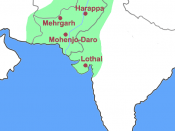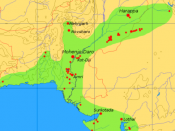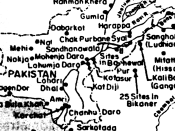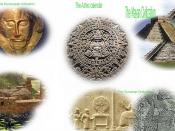What are the first few civilizations? If so, why is it that they are considered civilizations, and what about them? The first few river-valley civilizations are considered to be civilizations by our scholars, and each of those civilizations' characteristics, advantages by creating societies, and things that we should remember will prove them to be civilizations---as well as explain a little bit about each of those civilizations.
Mesopotamia, a river-valley civilization, is considered to be a civilization because of its characteristics. Mesopotamia has villages and cities. From common sense, what's a civilization without advanced and organized settlements like villages and cities? By having such unions, they can protect each other, share tools and help each other at key times in the agricultural cycle. On the contrary, barbarians (in other words, uncivilized people) are not that advanced. What we should remember about Mesopotamia is that they are so united that they can respond to the need to organize labor resources to create and maintain an irrigation network, like in the Tigris-Euphrates Valley, a land of little rain.
This proves their civilized-smarts. Enough said, Mesopotamia should indeed be considered to be a civilization because of it's characteristics-and, now, as promised, the next civilization.
Another river-valley country, Egypt, is also considered to be a civilization because of its characteristics. Egypt is known as a civilization because it has a settled agriculture. If it doesn't have a settled agriculture then they have no choice but to be barbarians -in other words, uncivilized people- to hunt for food. Anyway, an advantage that Egypt has for creating societies is order. Its societies, which are civilized, are composed of different classes, meaning order is a strong point because of their established system of organized societies. Something we should remember about Egypt is that its people take factors such as their environment to the best of their uses(like making monumental pyramids), making them a smart civilization. So, in conclusion, due to Egypt's characteristics, Egypt has the right to be considered as a civilization; without further ado, let's move onto our last civilization.
Finally, the last civilization to talk about-the Indus Valley. The Indus Valley possessed impressive technological capabilities like irrigation. So, due to the fact that its people have the technology of irrigation, they definitely have agriculture, and thus, they are civilized. Speaking of technology advances, by means of societies, they also advanced in trading to the east and west. This advantage is also a characteristic of what we consider civilized. Anyway, we should remember that although Indus Valley has their unpredictable and extreme environment going against them they are so civilized that they advanced by it and can bear it. In conclusion, Indus Valley has what it takes to be considered as a civilization.
From all that, they are sure qualified to be civilizations. The first few river-valley civilizations are considered to be civilizations by our scholars, and each of those civilizations' characteristics, advantages by creating societies, and things that we should remember will prove them to be civilizations---as well as explain a little bit about each of those civilizations.





